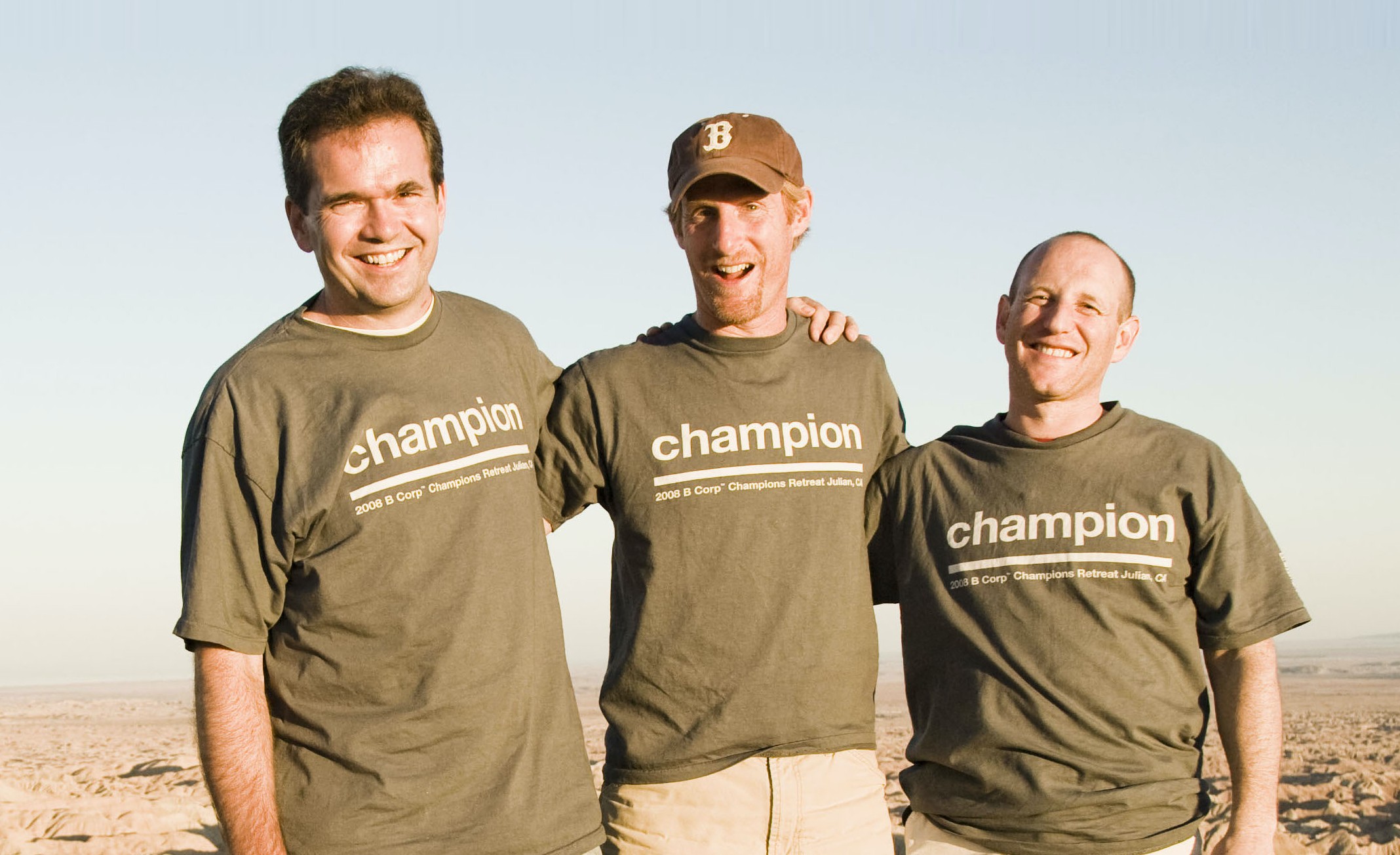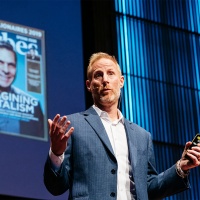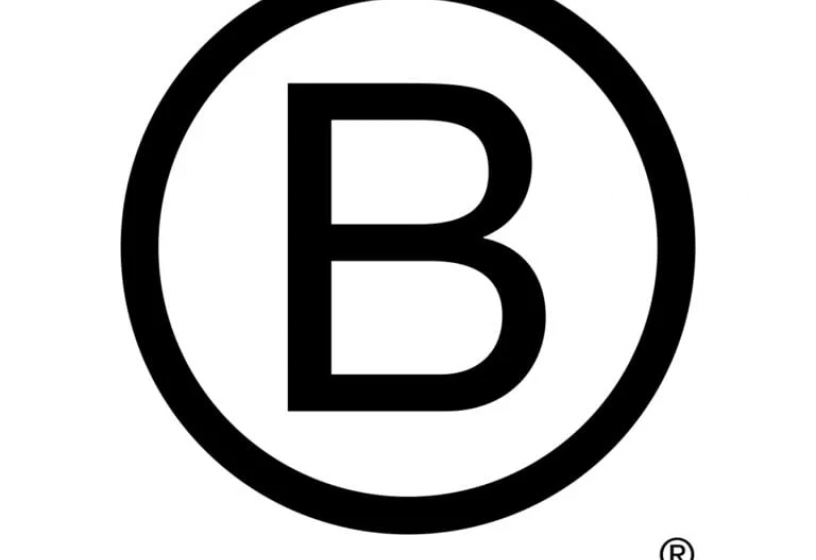B Corp co-founder Jay Coen Gilbert: "Our momentum is accelerating, and this transformation is happening, out of necessity"

INTERVIEW
Sustainability Mag: This was 16 years ago. You decided with your friends Andrew Kassoy and Bart Houlahan to found the B Corp movement. What was the trigger? What was your vision at the time?
Jay Coen Gilbert: We started B Lab because we were inspired by entrepreneurs who were using business as a force for good. As others followed their lead, those business leaders needed something to help the marketplace distinguish between good companies and just good marketing. With that market mechanism in place at scale in the form of the B Corp certification, it makes it easier for all of us to support good companies that reflect our values. We can work for those companies, buy from those companies, and invest in those companies.
Our vision was that one day all companies will compete to be not just best in the world, but best FOR the world. Best for workers. Best for communities. Best for the environment.
How do you define a good company?
A good company is a company that is good for workers, good for communities, good for the environment, and also good for shareholders, if it has any. The question is what is ‘good.’ That’s why B Corp certification is useful. Certified B Corporations meet rigorous third-party verified standards of overall social and environmental performance and public transparency, and also adopt stakeholder governance, making them legally accountable to balance profit and purpose. It’s the combination of performance, transparency, and accountability that distinguishes a good company from just good marketing.
B Corp is a huge success today. Do you think that scaling up business sustainability is within reach?
B Corps are an important part of the broader movement to scale up sustainability. There are now more than 6,000 Certified B Corporations around the world. More than 200,000 businesses have used the B Corp standards to manage and improve their impact, whether or not they ever seek certification. Our vision was never to have every company in the world become a B Corp, but to have every company in the world behave like a B Corp.
There are now large multinationals who are B Corps, and who align themselves with the movement by using the B Corp standards to manage and improve their impact. There are publicly traded corporations, venture-backed companies raising billions of dollars. The largest investor in the world is supportive of the stakeholder governance legal structure developed by the B Corp movement.
And yet, ‘within reach,’ is an elusive target. The B Corp movement, and even the larger better business movement, remains very small in the context of the global economy. There is a long way to go, but we are on the right path, our momentum is accelerating, and this transformation is happening, out of necessity.
There is a difficulty in certifying many companies without losing the essence and authenticity of B Corp. Yesterday, a B Corp was seen as absolutely cutting edge. Even today, B Corps are clearly seen as leaders. But is there a risk of diluting the value of B Corp recognition as we scale up?
No. With more than 100 million businesses in the world, there is no dilution of value if there are 6,000, 60,000, or 600,000 B Corps. In fact, the larger the B Corp community, the greater the value of the B Corp certification because the awareness of B Corp will increase, making it more valuable in attracting customers, talent, and investment.
Especially as the B Corp movement grows, and includes larger corporations, the question of credibility is more nuanced. The power of the movement rests on the credibility of the B Corp standards. Those standards will always be imperfect. That’s why the most important thing about the standards is that they are governed by a process of multi stakeholder engagement focused on continuous improvement. There have already been six evolutions of the B Corp standards, each one raising the bar, especially for large multinational corporations.
Because performance standards will always be imperfect, Certified B Corporations also must meet the legal requirement to adopt stakeholder governance. By making themselves legally accountable to consider the impact of their decisions on their workers, suppliers, customers, communities, and the environment, and not just shareholders, B Corps remain on the cutting edge. The legal requirement also ensures that the responsibility for making difficult decisions about tradeoffs is not focused solely on any set of imperfect performance standards, but appropriately part of the fiduciary duty of the board of directors. Sustainability can’t be outsourced to the B Corp standards; it must become a core competency of leadership. Stakeholder governance makes that more likely.
How is this being addressed internally within the growing B Lab teams?
B Lab is in the midst of its most fundamental review ever of its performance standards for certification. We have engaged thousands of stakeholders in a multiyear process to question every aspect of the performance requirements to ensure that B Corp certification continues to signal leadership.
Beyond the standards to become part of the B Corp community, the most important thing B Lab is doing to ensure the continued value and credibility of the B Corp movement is to ensure that B Corps are having meaningful impact through collective action.
Through the B Corp Climate Collective, more than 1,800 companies around the world have committed to net zero emissions by 2030, a full 20 years ahead of the Paris Agreement. The leadership of the B Corp community at COP25 made it clear that leading on sustainability was possible and consistent with a better way to do business. Their leadership made it possible for non-B Corps to follow their lead.
The same thing is happening around inequality. In response to the street protests several years ago, a group of Chilean B Corps organised Desafio 10X, a challenge to B Corps and all companies to keep the salaries of their CEOs within 10X of their lowest paid employees.
Prior, through collective action, B Corps created the stakeholder governance innovation that is now law in 40 U.S. states and a half dozen countries around the world. The B Corp community is working together to advance a public policy agenda that will accelerate adoption of stakeholder governance laws, as well as other public policies that will accelerate the transition to a just economy that works for everyone and for the long term.
B Lab addresses the issues of value and credibility by supporting B Corps to lead by example, not only inside their own companies, but alongside other companies, to redefine success, and to create systems and structures that make it easier for all companies to behave this way.

From left to right, Bart Houlahan, Jay Coen Gilbert, and Andrew Kassoy, the 3 B Corp co-founders in the early days of the movement.
More than an addition of virtuous companies, it is a movement that you wanted to form... for a change of system. How is our current system fundamentally flawed and designed for the few vs. the many?
Shareholder capitalism has a source code error. If the system is designed to maximise the financial returns to shareholders, it will, by design, externalise costs on to the rest of us, and concentrate the wealth in themselves. That doesn’t make individual capitalists bad people, but it does mean that we have a flawed system that is not designed to create shared wellbeing on a healthy planet.
This is why the fundamental upgrade of our economic operating system to stakeholder governance is so essential. Nothing else fixes the source code error of shareholder primacy. Nothing else leaves the day-to-day decisions to individuals closest to the facts and circumstances of each particular decision, and out of the hands of distant bureaucrats. Nothing else creates a new, elevated and level playing field on which all companies must compete with guardrails that protect the social and natural systems on which all life, and healthy markets, depend.
You are driven by a positive and constructive logic. So the idea is to fix the system and not to tear it down? To propose new rules of the game?
Yes. The B Corp movement is transformative not revolutionary. We must transform the system, and to do that will be difficult, frustratingly slow, and sometimes painful. There are elements of the current system that serve us well, and we should keep those. There are elements of the current system that do not serve us, in fact have never served most people, and those elements we must transform or discard. That is the creative destruction at the heart of a healthy economy.
We evolve. Our expectations evolve. Our systems should evolve too. That’s not revolutionary. That’s history. We are at an inflection point in history. We are so fortunate to be born at this moment, when our actions can set a new trajectory for humanity, and for humanity’s relationship with the rest of the natural world. How can we be good ancestors? That is the question I go to sleep with every night.
What is the capitalism of tomorrow?
The capitalism of tomorrow is equitable and regenerative. It is equitable because it gives every person what they need to reach their full potential. It is regenerative because it creates more than it takes. The capitalism of tomorrow is designed to achieve the higher purpose of creating shared wellbeing on a healthy planet. The capitalism of tomorrow is designed for interdependence, invests for justice, and accounts for all stakeholders.
The system change will not be easy you say since a complete change of culture is needed. Do you see good signs that our culture is starting to shift?
Yes. The populist movements across the ideological spectrum share a common analysis that the current system is broken. Many say it was designed to serve the few over the many. The first condition for system change is widespread recognition that the current system has failed. We have reached critical mass on this condition.
There are of course always going to be dinosaurs who are stuck in the past, with the cobwebs of old mental models clouding their judgment, feeling insecure about the uncertainty of a future they don’t quite understand. However, this small group is shrinking. And more importantly, they are beginning to recognise that they have an important role to play in this future. That their skills are needed.
The second precondition for system change is the presence of a visible, viable alternative. That is why the B Corp movement is so important. The B Corp movement is something we can all point to and say, Look, that’s what’s possible. It’s not the future. It’s already happening. It’s profitable. It’s fun. It’s just better.
However, the timing seems catastrophic for sustainable development. With rising obscurantism and populism, inflation and economic tensions, the current context favours political "sauve-qui-peut" and unfortunately overshadows the fundamental questions of a new sustainable model. How do you see this?
I see the opposite. Transformative change is most likely during times of upheaval when people across the ideological spectrum are searching for new ideas. We are fortunate to live in these times. We are at an inflection point. History is made by choices we make today that shape tomorrow. The future is an act of co-creation. This is our moment.
What becomes the role of business in this particular context? Is it able to offer a counterproposal that is up to the challenge? Is the role of business now becoming profoundly political?
There is no healthy business without a stable political environment that adheres to democratic ideals. Business has always been engaged in politics. The difference is that business is becoming engaged in politics in a way that benefits all stakeholders, not just shareholders. The transformation from shareholder capitalism to stakeholder capitalism is not only about what happens inside business, but also about how each business engages as corporate citizens.
What's next? How do you see the future?
What’s next is what’s now – the transition from shareholder capitalism to stakeholder capitalism. From an economy whose purpose is to maximise individual wealth to an economy whose purpose is to maximise shared wellbeing.
The future is an act of co-creation. What do we want to create? How will we be good ancestors? I want to create a future in which everyone is valued, has access to equitable resources to reach their full potential, and is part of joyful communities of belonging. Business has a powerful role to play to make that future a reality. I want to be a part of that. I want to be a part of communities working together to make that happen.

Jay Coen Gilbert
Jay Coen Gilbert is CEO of Imperative 21, a global network building narrative power for a just economy, and cofounder of B Lab and the B Corporation movement, with over 6,000 companies across 159 industries in 86 countries. Along with his B Lab cofounders, he received the Skoll Award for Social Entrepreneurship and the McNultyPrize at the Aspen Institute.
Since 2016, Jay Coen Gilbert has been called into antiracism work, recently co-convening an antiracist community of practice called White Men for Racial Justice (WMRJ). Prior, he co-founded AND 1, a $250M basketball footwear, apparel, and entertainment company. He grew up in NYC and graduated from Stanford University.
To be read also in the dossier "B Corp business reinventing capitalism"


